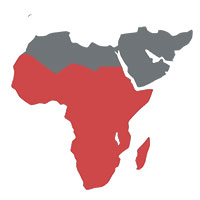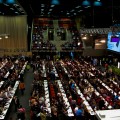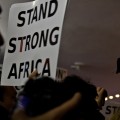Will Africa Always Be The Underdog?
Krishnee A | November 20, 2013.
The Africa Group, a coalition of African states, looks out for the continent, and it has much at stake during these UN climate talks in Warsaw. Despite their willingness to participate, they have had little chance to voice their concerns.
The Intergovernmental Panel on Climate Change (IPCC) agree Africa will suffer the most from climate change compared to the other continents. It is particularly vulnerable “because the capacity to adapt to climate change is limited considerably by widespread poverty.”
Since the formation of the UNFCCC in 1992, African delegates have faced major obstacles to participation. This has varied from their weaker position in the international climate system and their lower individual domestic capacities. Limited diplomatic resources have also diminished their understanding of effective practices within the process. This is why issues central to Africa like adaptation, access to finance and technology still figure prominently on their agenda.
Individual African countries have realised that their individual bargaining power is limited comparatively, hence their decision to negotiate as the African Group which is similar to other regional blocs. The generalist nature of negotiating blocs run risk of some states being marginalised in the climate negotiations. Each African state campaign for its own voice because even within each coalition, but there will always be winners and losers.
Their understanding of the challenge that climate change poses to their economy is well underpinned through a lived experience. Average temperatures have soared over the past century and are projected to increase by three to four degrees within the next century. This will have undue impacts on crops, disease risk rates and destroy infrastructure.
Droughts in the Horn of Africa (2011) and the Sahel region (2012) exemplified this. It’s easy to see why they are pushing towards an ambitious global climate agreement by 2015.
In Warsaw, they have been advocating for greater adaptation efforts, arguing that developed countries should support them financially and politically. The Green Climate Fund agreement, that has been established over the past negotiations, have pledged to mobilise US$100 billion every year by 2020 to assist countries in adaptation and mitigation. Disappointingly, a report by the African Climate Policy Centre of the UN Economic Commission for Africa shows that, of the $29.2 billion pledged since 2009, only 45 per cent has been committed, 33 per cent allocated and about seven per cent actually disbursed.
As climate negotiations in Warsaw grind slowly along, the frustration is evident from African delegates and NGOs working in the region. This is compounded by the utter lack of interest shown from the likes of Japan, Australia, the US and Canada. Just when the African voice had grown stronger and more meaningful, it is being silenced by the inaction of developing countries.
Whatever the outcome of COP19, it already presages doom for the African continent. Africa will have to, despite its participation here, rely on grassroots and domestic efforts to cope with climate change.
By Krishnee Appadoo, photo by Jade Neville.













comment